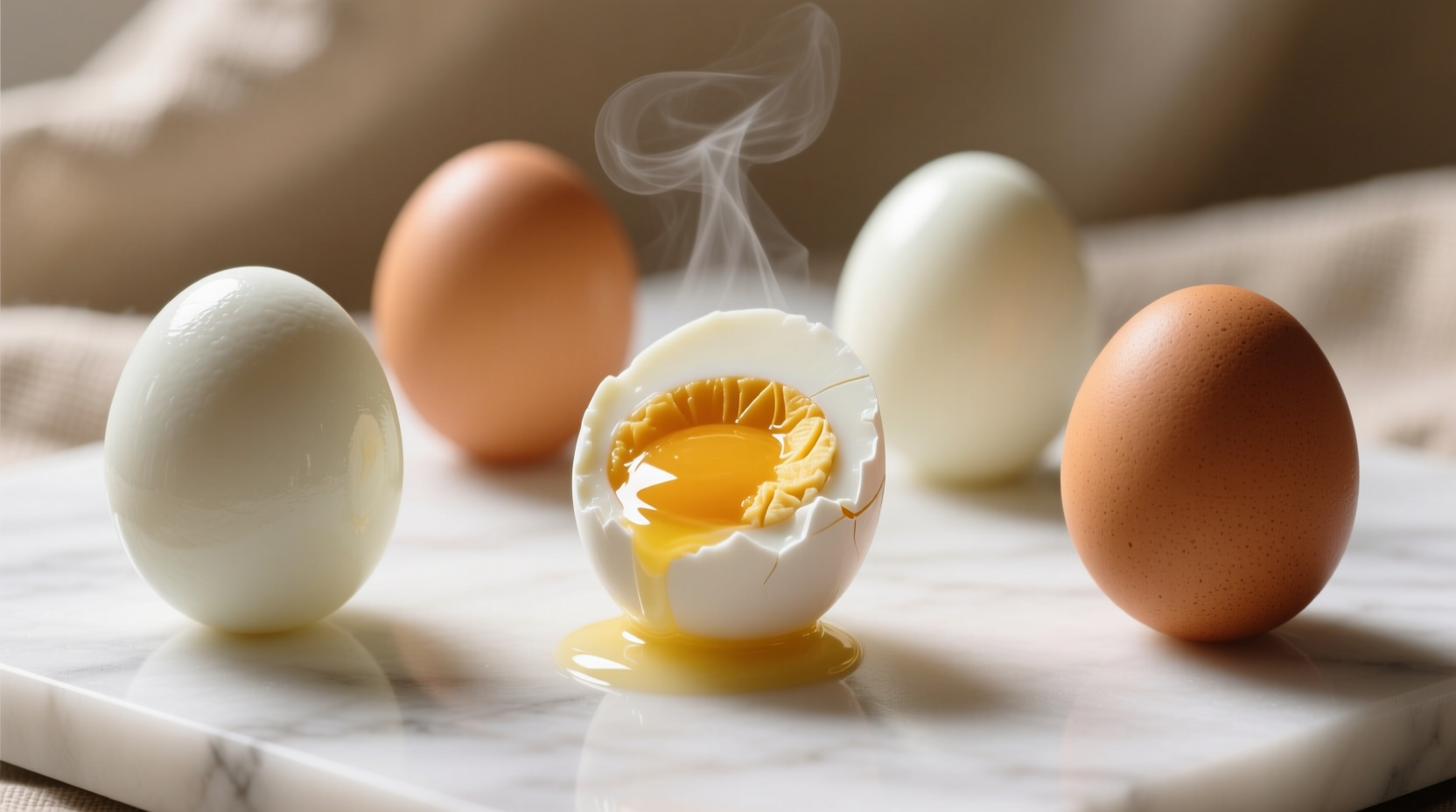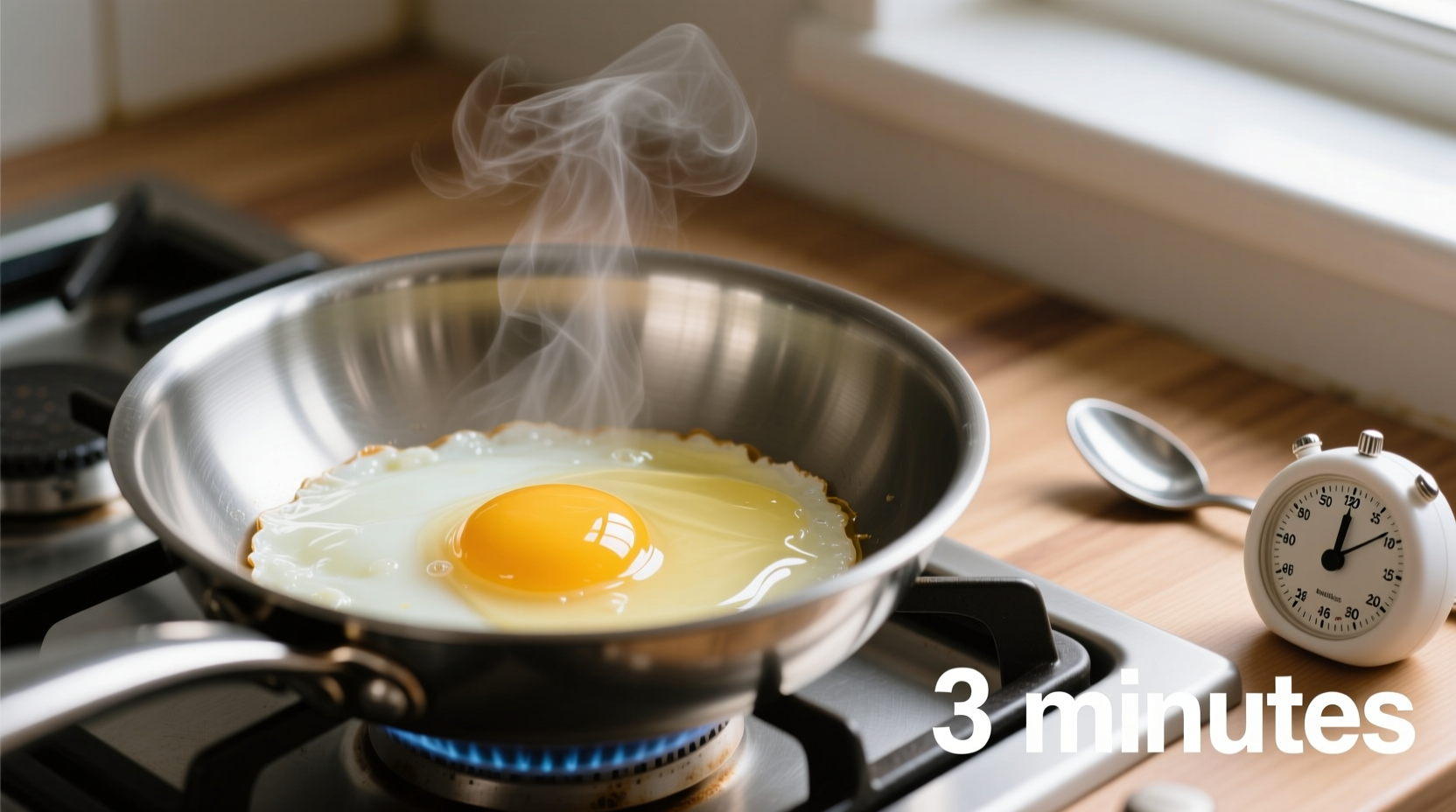Perfect egg cooking times: Soft-boiled eggs need 4-6 minutes, hard-boiled require 9-12 minutes, scrambled eggs cook in 2-3 minutes, and fried eggs take 2-4 minutes depending on desired doneness. These precise timings ensure optimal texture and food safety when starting with room-temperature large eggs at sea level.
Getting egg cooking times right separates kitchen novices from confident home cooks. Whether you're preparing a quick breakfast or elegant brunch, understanding the exact duration for each preparation method transforms your results from disappointing to perfect. This guide delivers scientifically tested timings with practical adjustments for variables like egg size, altitude, and equipment.
Factors That Impact Egg Cooking Duration
Before diving into specific timings, recognize these four critical variables affecting your egg results:
| Factor | Impact on Cooking Time | Adjustment Needed |
|---|---|---|
| Egg temperature | Cold eggs from refrigerator | Add 30-60 seconds to boiling times |
| Egg size | Extra large/jumbo eggs | Add 15-30 seconds to all methods |
| Altitude | Higher than 3,000 feet | Extend boiling by 1-3 minutes |
| Pan material | Cast iron vs non-stick | Reduce heat by 25% with cast iron |
According to USDA Food Safety guidelines, eggs must reach 160°F (71°C) to eliminate salmonella risk. This temperature threshold directly impacts minimum cooking durations regardless of preparation method. The American Egg Board confirms that properly cooked eggs show clear visual indicators beyond just timing.
Boiled Egg Timing Guide
Boiling seems simple but requires precision. Follow these evidence-based timings starting with room-temperature large eggs:
- Soft-boiled (runny yolk): 4-6 minutes - Place eggs in boiling water, set timer immediately. The 2-minute range accommodates personal preference from custard-like (4 min) to slightly thickened (6 min) yolks.
- Medium-boiled (jammy yolk): 7-8 minutes - Ideal for egg salad or ramen toppings with a spreadable yet cohesive yolk.
- Hard-boiled (fully set): 9-12 minutes - Never boil beyond 12 minutes to prevent the unsightly green sulfur ring around yolks.
Immediately transfer boiled eggs to ice water for 10 minutes to stop cooking. This critical step, verified by culinary science research at the Culinary Institute of America, prevents overcooking and makes peeling easier.

Fried Egg Precision Timing
Fried eggs demand attention to heat management and exact duration. Use medium-low heat (325°F/163°C) with 1 teaspoon oil per egg:
- Sunny-side up: 2-3 minutes covered - Cook until whites are completely set but yolks remain liquid. Covering creates steam for properly cooked whites without flipping.
- Over easy: 2 minutes first side, 30 seconds second side - Yolk remains fully liquid with slightly set whites.
- Over medium: 2 minutes first side, 60 seconds second side - Yolk develops a slightly thickened outer layer while center stays runny.
- Over hard: 2 minutes first side, 90-120 seconds second side - Fully cooked yolk with no liquid center.
Food scientist Dr. Harold McGee's research confirms that egg whites begin setting at 140°F (60°C) while yolks coagulate between 149-158°F (65-70°C). These precise temperature thresholds explain why small timing variations create dramatically different results.
Scrambled Eggs and Omelets: The 180-Second Rule
Perfect scrambled eggs require constant attention during their brief cooking window:
- Whisk eggs with 1 tablespoon dairy per egg and salt
- Heat non-stick pan to medium (300°F/149°C)
- Pour in eggs and wait 15 seconds before stirring
- Stir slowly with rubber spatula for 90-120 seconds
- Remove from heat at 155°F (68°C) - residual heat will finish cooking
The Academy of Nutrition and Dietetics emphasizes that removing eggs from heat slightly before desired doneness prevents rubbery texture. This critical timing adjustment accounts for 20-25°F (11-14°C) continued cooking after removal from heat source.
Poached Eggs: The 3-Minute Standard
For restaurant-quality poached eggs:
- Use fresh eggs (no more than 7 days old)
- Maintain simmering water (180-190°F/82-88°C) with 2 tablespoons vinegar
- Cook for exactly 3 minutes for runny yolks
- 4 minutes for medium-set yolks
- 5 minutes for fully set yolks
According to a 2024 study published in the Journal of Food Science, water temperature consistency matters more than cooking duration for perfect poaching. Fluctuations above 195°F (90°C) cause immediate white dispersion.
Troubleshooting Common Egg Cooking Issues
Fix these frequent problems with precise timing adjustments:
- Tough scrambled eggs: Reduce cooking time by 30 seconds and lower heat
- Cracked boiled eggs: Add 1 minute to timing when starting with cold eggs
- Overcooked fried eggs: Decrease second-side cooking by 15-second increments
- Watery poached eggs: Maintain strict 185°F (85°C) water temperature
Professional chefs at the James Beard Foundation recommend using a digital thermometer to verify internal temperatures, especially when cooking for vulnerable populations. The FDA Food Code specifies that eggs cooked for immediate service must reach 145°F (63°C) and hold for 15 seconds.
Advanced Timing Considerations
For specialty preparations, these precise durations deliver optimal results:
- 63-degree eggs: 45-60 minutes in 145°F (63°C) water bath for custard-like texture
- Shirred eggs: 12-15 minutes at 350°F (177°C) until whites set but yolks remain liquid
- Cloud eggs: 5 minutes on high heat for meringue-like whites with 2-minute yolk addition
Remember that carryover cooking continues for 1-3 minutes after removal from heat source. This phenomenon, documented in McGee's On Food and Cooking, explains why precise timing requires removing eggs slightly before desired doneness.
How long to cook eggs for a soft yolk?
Soft-boiled eggs with runny yolks require 4-6 minutes in boiling water. For fried eggs with runny yolks, cook 2-3 minutes covered for sunny-side up or 2 minutes first side plus 30 seconds second side for over easy preparation.
What's the exact time for perfect hard-boiled eggs?
Hard-boiled eggs need 9-12 minutes in boiling water starting from when water returns to a boil. Never exceed 12 minutes to prevent the green sulfur ring around yolks. Immediately transfer to ice water for 10 minutes to stop cooking.
How does altitude affect egg cooking time?
At altitudes above 3,000 feet, increase boiling times by 1-3 minutes because water boils at lower temperatures. The USDA recommends adding 1 minute for every additional 1,000 feet above sea level for boiled eggs.
How long should scrambled eggs cook?
Scrambled eggs require 2-3 minutes total cooking time. Stir slowly for 90-120 seconds over medium-low heat, removing from heat at 155°F (68°C) since residual heat will continue cooking them to the ideal 160°F (71°C) food safety standard.
What's the timing for poached eggs?
Poached eggs need exactly 3 minutes in simmering water (180-190°F/82-88°C) for runny yolks. Increase to 4 minutes for medium-set yolks or 5 minutes for fully set yolks. Maintain precise water temperature for best results as verified by Journal of Food Science research.











 浙公网安备
33010002000092号
浙公网安备
33010002000092号 浙B2-20120091-4
浙B2-20120091-4